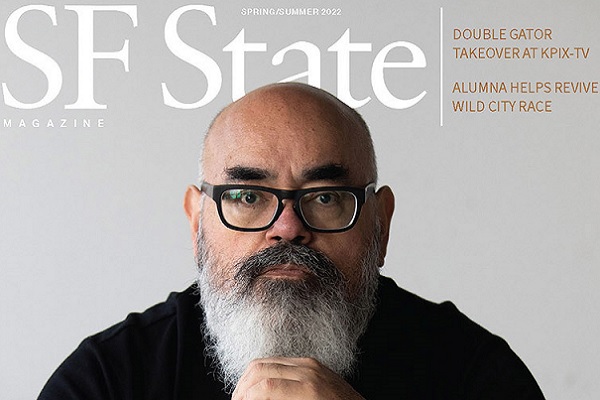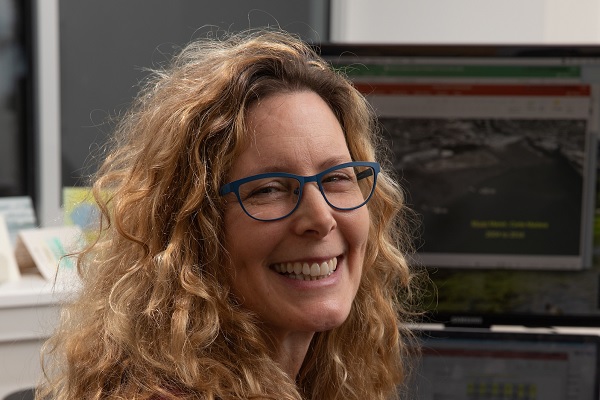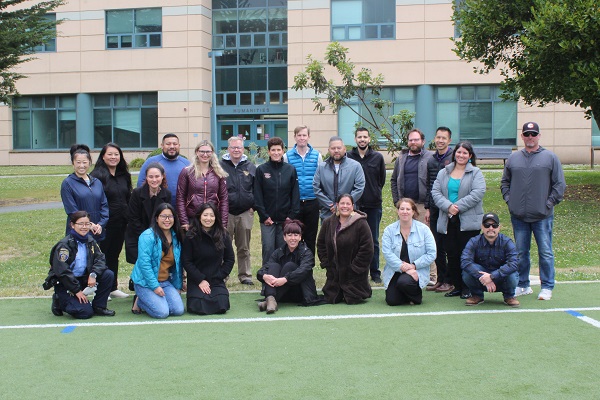News & Announcements

The cover story of the Spring/Summer 2022 issue of SF State Magazine takes an in-depth look at an alumnus who came back to campus as a professor — one who challenged the University to bring more diversity to the classroom. Now director of SF State’s School of Art, Victor De La Rosa has made it his mission to give students more access to the BIPOC mentors he was looking for as a fledgling young artist.
Other feature stories include profiles of KPIX news anchors (and alumni) Sara Donchey and Ryan Yamamoto; a look at the Inclusion Pilot Project, which gives students with intellectual and developmental disabilities access to lifechanging learning opportunities; and a photo essay capturing the colorful fun at a wacky San Francisco race organized by alumna Stella Lochman. The online issue also features interviews with Frederick Smith, the University’s associate vice president for Equity & Community Inclusion, and graduate student J Patterson, who was recently honored by the California State University for her advocacy for LGBTQ youth.
A new feature — exclusive to the magazine website — will offer a candid look at the production of each issue. The inaugural Behind the Scenes introduces readers to cover photographer Benjamin Fanjoy ... who also happens to be a Journalism major at SF State.

Katharyn Boyer became interim executive director of the Estuary & Ocean Science (EOS) Center on June 6. Since joining EOS over 18 years ago as an assistant professor of Biology, Boyer has built a strong and well-funded research program in coastal ecology, specializing in science-informed restoration to increase the resiliency of estuarine habitats and low-lying, vulnerable human communities. She’s led several multi-institutional “living shorelines” projects, which incorporate habitat restoration into shoreline protection and investigate aquatic species’ role in carbon storage and ocean acidification. She also works to inform policy in this field, including as an advisor to the California Ocean Science Trust’s Equitable Nature-Based Coastal Adaptation program.
At SF State, Boyer has helped develop undergraduate and graduate programs to immerse students in marine ecology and conservation. Her teaching focuses on applying basic ecological understanding and scientific methodology to conservation and management problems, especially in response and adaptation to climate change.
Boyer earned a B.S. in Zoology at the University of Maryland, College Park, an M.S. in Biology/Ecology at San Diego State and a Ph.D. in Biology/Ecology at UCLA. A fellow of the California Academy of Sciences, her accolades include the 2021 Coastal and Estuarine Research Federation William A. Niering Outstanding Educator Award and SF State’s 2021 Distinguished Faculty Award for Excellence in Teaching. Boyer is uniquely qualified to take the reins at the EOS Center. She has a deep understanding of the Center’s needs and complexities and a strong enthusiasm for growing educational and research initiatives and strengthening ties with University programs.

A campus-wide Staff Years of Service Recognition Luncheon was held outdoors on June 2 on the West Campus Green to honor staff who have served the University for up to 40 years (in five-year benchmarks as of December 2021). The ceremony was emceed by President Lynn Mahoney and Ingrid Williams of Human Resources, and University vice presidents joined in support of their staff. This annual celebration was mail-only during the pandemic, and the University plans to invite honorees from 2019 and 2020 to celebrate their service at an event later this year.
The University thanks all employees for their years of dedicated service to our campus. For any questions about this event, please contact Nancy Ganner at ganner@sfsu.edu.
The Division of Student Affairs is pleased to announce that, after a competitive national search, Nicole Redding has been appointed to serve as the next director of the Disability Programs & Resource Center (DPRC) effective June 10, 2022. With more than nine years of professional experience in public higher education (five-plus years at Montana State and the past four years here at SF State), Redding is excited to continue on in her leadership role at DPRC.
Redding has served with distinction as DPRC interim director for the past year, successfully navigating a safe return to campus for in-person services, launching an interactive database for employee accommodations and completing a number of critical staff searches. Prior to joining SF State as associate director of the DPRC in January 2019, Redding held leadership roles at Montana State’s Disability, Re-Entry, & Veteran Services, including program coordinator and program manager. She holds a B.A. in Music from the University of Oregon and an MPA from Montana State.
“I want to thank Nicole for her excellent service as interim director and congratulate her on this new appointment,” said Gene Chelberg, AVP for Student Affairs.
Special thanks to Cathy Kudlick, search committee chair, and the rest of the search committee members for their excellent work in completing the search so successfully. Thanks also to Steven Solomon for staffing the committee and to the entire DPRC staff for their support during these challenging times.
The San Francisco Pride Parade and Celebration takes place June 25 and 26 this year. SF State will host a booth during the two-day festival and have a group walking during the SF Pride Parade Sunday, June 26. The SF State Pride Committee is looking for students, staff and faculty to join this year’s Pride contingent. Interested in walking in the parade, joining the Pride committee or volunteering in other ways? Fill out a quick online survey via Qualtrics before noon on Wednesday, June 22.
SF State’s Fine Arts Gallery has been approved for a $50,000 award from the National Endowment for the Arts (NEA) to support a project commemorating the Garden of Remembrance on campus. “Reflecting on Ruth Asawa’s Garden of Remembrance” will feature temporary public art, outdoor programs, a publication and an exhibition in the Fine Arts Gallery in spring 2024.
The Garden of Remembrance, nestled between Burk Hall and the Fine Arts building, honors 19 Japanese American SF State students forcibly removed during World War II and sent to internment campus. San Francisco artist Ruth Asawa, herself a former camp internee, designed the garden. Dedicated in 2002, it was made possible by a grant from the California Civil Liberties Public Education Program.
“Reflecting on Ruth Asawa’s Garden of Remembrance” is among 1,125 projects across America totaling more than $26.6 million that were selected during this second round of Grants for Arts Projects fiscal year 2022 funding.
“The National Endowment for the Arts is proud to support arts and cultural organizations throughout the nation with these grants, including San Francisco State University, providing opportunities for all of us to live artful lives,” NEA Chair Maria Rosario Jackson said. “The arts contribute to our individual well-being, the well-being of our communities and to our local economies. The arts are also crucial to helping us make sense of our circumstances from different perspectives as we emerge from the pandemic and plan for a shared new normal informed by our examined experience.”
Each year, the Panetta Institute invites CSU presidents to nominate an outstanding undergraduate student leader from each campus to participate in a Congressional internship in Washington, D.C., during the fall semester. The 2022 Panetta Congressional intern for SF State will be Hector Soto.
Soto was born in Lodi, California, and graduated from Lodi High School in 2015. He then enlisted in the U.S. Marine Corps and served for four years. He was stationed in Okinawa, Japan, and Pennsylvania. After being honorably discharged, he chose to return to school and graduated from Los Medanos College with an associate’s degree with honors in 2021 and a certification in personal training. Soto is currently working towards a bachelor’s degree in Sociology and minor in Race and Resistance Studies. In his spare time, he enjoys weightlifting, helping others and spending quality time with his 4-year-old son and dog.
The campus-wide Business Continuity Program is designed to continuously enhance the University’s resilience and encourage contingency planning for campus priorities, allowing the continuity of critical operations and services following disruptive events. The Business Continuity team’s goal for the coming fiscal year is to engage campus partners in the process of updating existing plans and generating new continuity plans. SF State Business Continuity Coordinator Jacqueline Najera has been reaching out to business units to schedule an initial business continuity consultation. If you would like for your business unit to begin these efforts immediately, feel free to initiate a discussion with her by emailing continuity@sfsu.edu or calling (415) 338-1540.
Human Resources is offering virtual learning sessions through the EAP (Employee Assistance Program) for all staff and faculty. Topics for June and July include “Dealing with Difficult Personalities,” “Business Etiquette,” “Respect in the Workplace,” “How to Highlight Your Accomplishments,” “Managing Multiple Priorities,” “Identity Theft” and “Conflict Management Styles.” Visit Qualtrics to see a full schedule and RSVP for sessions.
The campus community is invited to a breezy, casual outdoor lunch co-presented by SF State’s LGBTQ Faculty, Staff and Allies listserv and Women’s Coalition Thursday, June 30. The lunch will be held on the fifth floor patio of the Administration Building from noon to 1 p.m. Bring your lunch and a colleague (and likely a sweater if you want to stay warm) and help these two groups come together to celebrate June in San Francisco. Coffee and cookies will be provided, courtesy of Human Resources. All are welcome! More info on these groups can be found on the Human Resources website.
Spotlight
A new study reports that obesity disparities are larger between segregated schools than within racially integrated schools. The authors, including Professor of Public Health Emma Sanchez-Vaznaugh, published the findings in the journal Obesity. They evaluated childhood obesity disparities in publicly available data from a physical fitness test administered to fifth, seventh and ninth grade students at more than 8,900 California public schools. Disparities in obesity between Latino, Black and Filipino children compared with White children were larger between segregated schools than disparities within integrated schools.
Obesity prevention interventions targeting integrated schools with children of color or schools located in socioeconomically disadvantaged neighborhoods may be beneficial in curbing the child obesity epidemic, the researchers conclude.
Office of International Programs Associate Director Jay Ward co-chaired a presentation at the NAFSA: Association of International Educators Annual Conference in Denver, which took place May 31 – June 3. Ward chaired and served as a presenter at the session “The Fulbright International Education Administrator (IEA) Seminars: Yes, You Can!”
Public Health Lecturer Jessica Wolin was the featured presenter for the National Nurse-Led Care Consortium webinar “Chronic Stress, Housing and Health: Patient Experiences and Strategies for Comprehensive Care” on June 15. The webinar featured Wolin’s review of research on the impact of living in public housing on health and a panel of experts offering patient perspectives and experiences with trauma-informed care in community and patient engagement.
Assistant Dean of Students Mia Reisweber appeared on “The Spouse Angle” podcast on June 8 for a discussion on child care for military families. Research has found that military child care centers are plagued by long waiting lists and understaffing.
“If you don’t have [child care], then your military families are really not being supported as holistically and as genuinely as they could be,” said Reisweber, a military spouse and mother of two young children. “If your spouses can’t work but they’re highly qualified to work, it’s a strain on the family.”
Cinema Professor Daniel Bernardi was a speaker at the Memorial Day ceremony held at the San Francisco National Cemetery. He is an Iraq War veteran, a U.S. Navy Reserves commander and the director of SF State’s Veteran Documentary Corps.
In a May 31 feature on KCBS-AM, Asian American Studies Professor Valerie Soe discussed media representations of Asian Americans and Pacific Islanders. Soe, an experimental filmmaker, says she shows documentaries in her classes about Asian American activism in an effort to dismantle racist stereotypes.
“I think there is a stereotype that Asian Americans are very passive and quiet model minorities,” Soe said. “So to show that that’s actually not true and that there is a history of radicalism in the Asian American community is very important.”
A May 31 essay for the Criterion Collection highlights the 1982 independent film “Chan Is Missing.” Asian American Studies Professor Emeritus George Woo and Asian American Studies Professor Emerita Laureen Chew both had roles in the film, directed by Wayne Wang. Woo and Wang met at a learning center in San Francisco’s Chinatown where Wang taught English.
The essay, by CSU Long Beach Sociology Professor Oliver Wang, argues that “Chan Is Missing” is one of the most important American films of the past 50 years.
“Representation and recognition have been priorities in Asian American communities for decades,” Wang wrote, “and part of the brilliance of Wang’s solo debut is its ability to present a small-scale story, set in a hyperlocal Chinese American community, with an underrated comic flair, and use that to lure the audience into an expansive treatise about social identity and belonging.”
A June 14 story on KALW-FM explored the challenges Indigenous tribes face in receiving sovereignty from the U.S. government. Journalism Professor Cristina Azocar says the cost and complexity of the sovereignty process are the main challenges. Misconceptions about sovereignty are also a serious issue.
“It’s important to understand that tribes do not seek federal recognition to open casinos. Tribes do it to exert the rights to sovereignty with the federal government,” said Azocar, author of “News Media and the Indigenous Fight for Federal Recognition” (Lexington Books, 2022). “Federal recognition doesn’t mean benefits. It means the tribes have the right to govern themselves, provide for their people with services such as health care, education and cultural revitalization.”
A June 10 story on KRON-TV determined to find out the truth about a supposed California accent. Like, is it a real thing? Totally, according to Teresa Christine Pratt, assistant professor of English Language and Literature.
“‘Everyone has an accent’ is the standard answer every linguist will give,” she said.
Pratt added that certain speech patterns are more California-specific than others, such as ending a phrase with a higher tone, speaking in a creaky voice and saying “like” a lot.